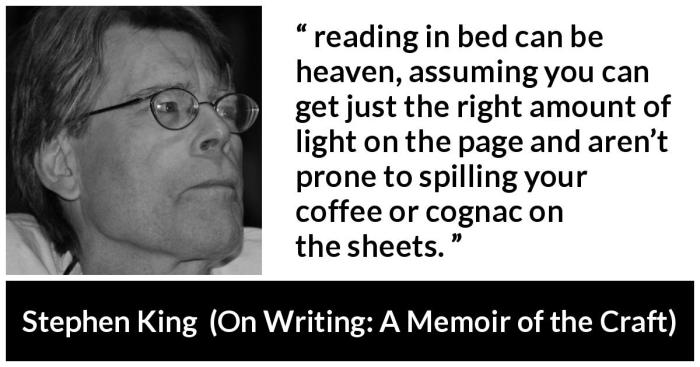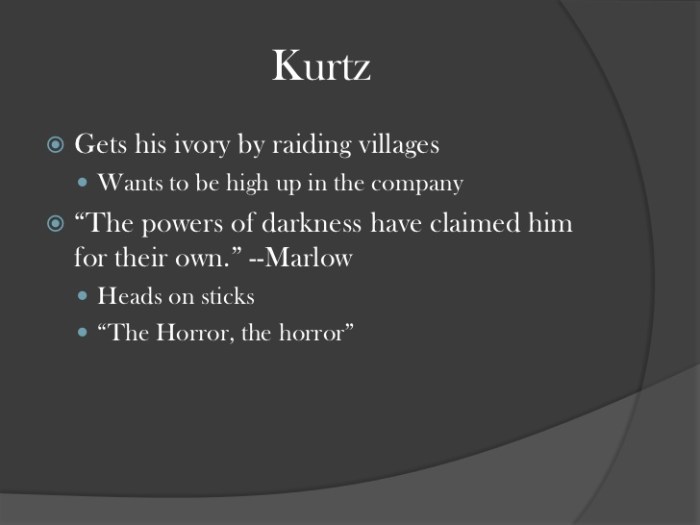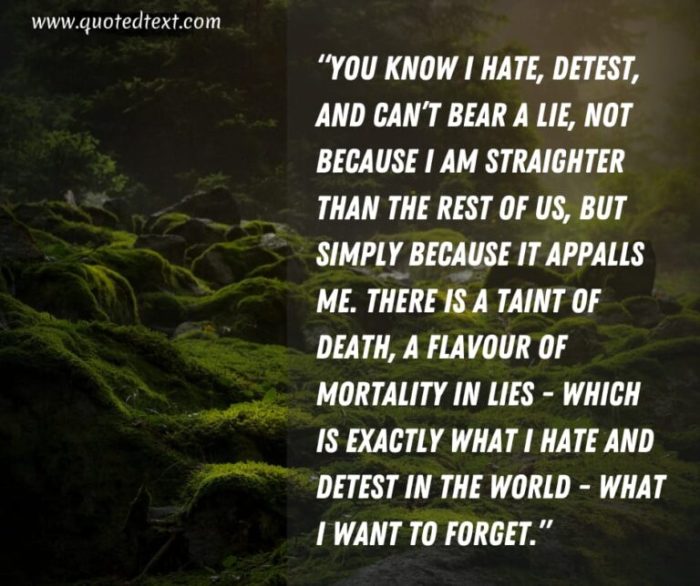Quotes about kurtz heart of darkness – Quotes about Kurtz in Joseph Conrad’s “Heart of Darkness” delve into the profound literary significance, psychological insights, symbolism, and cultural context that shape his enigmatic character and the novel’s enduring themes.
Kurtz’s infamous utterances illuminate the darkness and depravity of the human psyche, revealing the motivations, desires, and inner conflicts that drive his actions. These quotes become a lens through which we explore the complexities of good and evil, the nature of colonialism, and the fragility of civilization.
Literary Significance of Kurtz’s Quotes

Kurtz’s quotes serve as pivotal moments in the novel, revealing profound insights into the novel’s themes and characters. His words explore the darkness of the human heart, the dangers of unchecked ambition, and the fragility of civilization.
Famous Lines and Their Significance
- “The horror! The horror!” – Kurtz’s dying words encapsulate the unspeakable atrocities he has witnessed and committed, reflecting the novel’s exploration of the darkest aspects of humanity.
- “Exterminate all the brutes!” – Kurtz’s brutal philosophy exemplifies the dehumanization and savagery that result from the loss of moral boundaries in the Congo.
- “I am a voice crying in the wilderness” – Kurtz’s self-pitying words highlight his isolation and the futility of his attempts to bring enlightenment to the “savages.”
Psychological Insights through Kurtz’s Quotes

Kurtz’s quotes provide a glimpse into his complex and troubled psyche. His words reveal his inner conflicts, motivations, and desires, exposing the darkness that resides within the human mind.
Motivations and Desires
- Kurtz’s desire for power and control is evident in his ruthless actions and his belief in the superiority of Europeans over Africans.
- His yearning for recognition and fame drives him to seek glory and adventure in the Congo, ultimately leading to his downfall.
Inner Conflicts
- Kurtz struggles with his own morality, torn between his civilized self and his savage instincts.
- He grapples with the guilt and shame of his actions, but his pride prevents him from acknowledging his own depravity.
Symbolism and Metaphor in Kurtz’s Quotes: Quotes About Kurtz Heart Of Darkness
Kurtz’s quotes employ rich symbolism and metaphor, enhancing the novel’s themes and character development. These literary devices evoke powerful images and concepts, creating a deeper understanding of the novel’s central ideas.
Darkness and Depravity, Quotes about kurtz heart of darkness
- Kurtz’s frequent references to “darkness” symbolize the moral and spiritual decay that pervades the Congo and the human heart.
- The “heart of darkness” represents the uncivilized and savage aspects of humanity that Kurtz himself embodies.
Civilization and Barbarism
- Kurtz’s descent into savagery is a metaphor for the fragility of civilization and the ease with which it can be corrupted.
- The contrast between Kurtz’s civilized facade and his barbaric actions highlights the duality of human nature.
Cultural and Historical Context of Kurtz’s Quotes

Kurtz’s quotes reflect the cultural and historical context of the novel. They are influenced by the era’s prevailing ideas about race, imperialism, and the nature of civilization.
Imperialism and Colonialism
- Kurtz’s belief in European superiority is a reflection of the widespread racist attitudes of the time.
- His exploitation of the African people symbolizes the brutality and dehumanization inherent in colonial rule.
Civilization and Progress
- Kurtz’s descent into savagery challenges the idea of progress and the belief that civilization is inherently superior to barbarism.
- The novel’s setting in the Congo, a region ravaged by colonialism, highlights the destructive consequences of unchecked ambition and the arrogance of Western powers.
Cinematic Adaptations and the Portrayal of Kurtz’s Quotes

Cinematic adaptations of Heart of Darkness have interpreted and visualized Kurtz’s quotes in various ways, offering unique perspectives on the novel’s themes and characters.
Francis Ford Coppola’s Apocalypse Now (1979)
- Coppola’s adaptation transposes the novel to the Vietnam War, using Kurtz’s quotes to explore the horrors of war and the darkness within humanity.
- Marlon Brando’s iconic portrayal of Kurtz emphasizes his madness and charisma, making his quotes even more chilling.
Werner Herzog’s Aguirre, the Wrath of God (1972)
- Herzog’s film draws parallels between Kurtz and the historical figure Lope de Aguirre, a Spanish conquistador who led a disastrous expedition into the Amazon.
- Klaus Kinski’s intense performance as Aguirre captures the character’s megalomania and the destructive power of his words.
Quick FAQs
What is the significance of Kurtz’s famous line, “The horror! The horror!”?
This exclamation epitomizes Kurtz’s realization of the profound darkness and brutality he has witnessed and participated in during his time in the Congo. It encapsulates the horror of colonialism, the loss of humanity, and the fragility of civilization.
How do Kurtz’s quotes reflect the psychological complexities of his character?
Kurtz’s quotes reveal his inner turmoil, his struggle between his civilized self and the savage instincts that the Congo has awakened within him. They expose his motivations, his desires for power and control, and his ultimate descent into madness.
What is the symbolic meaning of the ivory Kurtz has collected?
The ivory represents the greed and exploitation that have corrupted Kurtz and the colonial enterprise. It symbolizes the material wealth that has driven Kurtz’s actions and the emptiness and destruction that ultimately result from his pursuit of it.